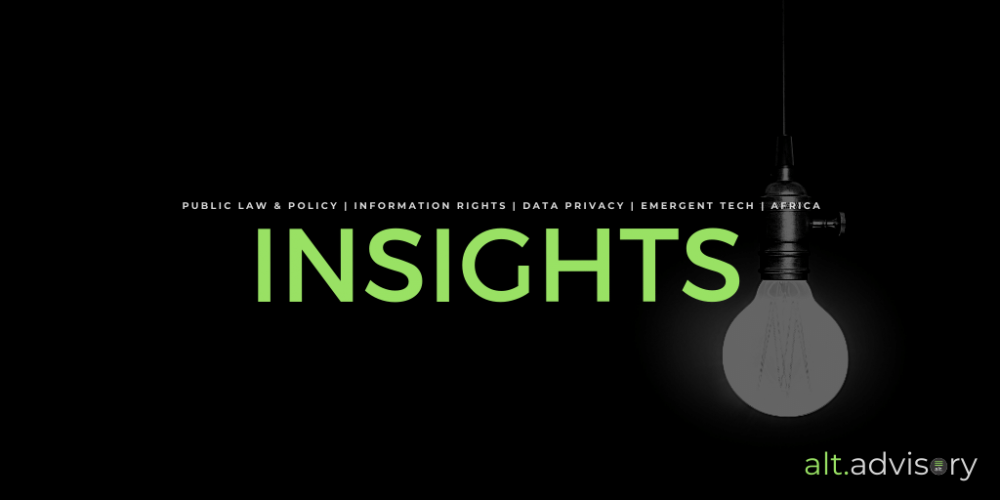Know your reproductive rights
ABSTRACT
The recent decision of the Supreme Court in America to reverse the decision legalising abortion has garnered significant international and domestic attention, with many people anxious about what this may mean for their reproductive rights. This Insight highlights South Africa’s position on reproductive rights and provides access to useful resources on abortion.
KEYWORDS
Reproductive rights – Equality and inclusion
Citation: T Power, Know your reproductive rights, ALT Advisory Insights 2022 (2) (29 June 2022).
![]()
+-*#*-+
Last week, the United States Supreme Court handed down Dobbs v Jackson Women’s Health Organisation, which has been described by the ACLU as a “shameful, sweeping, politically-driven decision that will have life-altering, and indeed, life-threatening consequences for women and other people who can become pregnant.” The Dobbs ruling overturns Roe v. Wade, the landmark 1973 decision which legalised abortion in the United States. Finding that the right to abortion is not deeply rooted in American history, the majority of the Court went on to find that the previous decisions of the Court providing for the right to abortion were incorrect and ultimately found that the question of abortion should be left to the people and their elected representatives. In other words, the decision paves the way for individual states to choose how to regulate, restrict, or ban abortions.
The minority took issue with the scope for states to assert control over an individual’s body and the deeply personal decisions one makes about their body. The minority raised further concern that the majority’s departure from legal precedent would create legal instability, and may jeopardise other rights from contraception to same-sex intimacy and marriage. After the sombre observation that young women today will have fewer rights than their mothers and grandmothers had, the minority emphasised their sorrow for the many millions of American women who have lost a fundamental constitutional protection.
Shortly after the decision was handed down, 13 states pulled the trigger on prepared laws banning abortion, with more to follow.
This case has been the subject of public debate for months surrounding the hearing, and the leak of the draft decision earlier this year. Following the decision, polarising debates have intensified and protests have persisted, garnering significant international and domestic attention, with many people anxious about what this may mean for their reproductive rights.
KNOW YOUR RIGHTS
Your rights under international human rights law
Fortunately, the international human rights community have been quick to confirm the international human rights law position. United Nations experts on equality along with several UN Special Rapporteurs have collectively condemned the Dobbs decision, pronouncing that it amounts to a “monumental setback for the rule of law and for gender equality. With the stroke of a pen and without sound legal reasoning, the US Supreme Court has stripped women and girls in the United States of legal protections necessary to ensure their ability to live with dignity.”
The rights of women to make autonomous decisions about their own bodies and reproductive functions are at the very core of their fundamental rights to equality, dignity, privacy, and sexual and reproductive health rights – rights protected under international human rights law. It is well established that abortion restrictions impact these rights. Abortion access, therefore, finds protection under international human rights law.
Your rights in South Africa
In addition to the international human rights law protections, South Africa has constitutional and legislative protections that safeguard sexual and reproductive rights. Our Constitution provides for the rights to:
- equality (section 9);
- dignity (section 10);
- make decisions concerning reproduction (section 12(2));
- privacy (section 14); and
- health services including reproductive health care (section 27(1)(a))).
In giving effect to these constitutional protections, our courts have confirmed that “the fundamental right to individual self-determination itself lies at the very heart and base of the constitutional right to termination of pregnancy”.
Abortion found legislative protection in South Africa in 1996, through the Choice on Termination of Pregnancy Act (CTOPA). CTOPA promotes reproductive rights and enables freedom of choice by affording every woman and girl the right, within certain parameters based on health considerations, to choose whether to terminate a pregnancy. The enactment of CTOPA was lauded as a “ground‑breaking and progressive policy change” that strengthens sexual and reproductive health rights and “serves as a global model for the reform of termination of pregnancy law”.
CTOPA prescribes when who, and under what condition a pregnancy can be terminated:
- Up to 12 weeks: Getting an abortion is purely based on the women’s choice, and no reason is required. A registered and trained medical practitioner, a registered and trained nurse, or a registered and trained midwife can terminate the pregnancy.
- Between 13 and 20 weeks: After the first trimester the pregnancy may be terminated, by a registered and trained medical practitioner, if:
- the continued pregnancy would pose a risk of injury to the woman’s physical or mental health;
- there is a substantial risk that the foetus would suffer from a physical or mental abnormality;
- the pregnancy resulted from rape or incest; or
- the continued pregnancy would significantly affect the social or economic circumstances of the woman.
- After 20 weeks: At this stage, a pregnancy can only be terminated if it would endanger the woman’s life, result in severe malformation of the foetus, or pose a risk of injury to the foetus. Two medical practitioners need to agree on this.
Minors (persons under the age of 18) are also empowered to terminate their pregnancy. CTOPA provides that a medical practitioner or a registered midwife, should advise the minor to consult with their parents, guardian, family members or friends before the pregnancy is terminated, however, they cannot force the minor to do so, and the termination cannot be refused if the minor chooses not to consult.
Our Constitution and our abortion laws safeguard the moral autonomy, personhood and bodily integrity of women and girls, and other people who can become pregnant. Thankfully CTOPA has “withstood attempts to strike it down in the courts and to dilute its provisions in Parliament”. In response to concerns around the implications of Dobbs in South Africa, Professor of Law and South African Research Chair in Equality, Law and Social Justice, Cathi Albertyn remarked that “we have the kind of abortion law that American feminists dream of. And the chances of these protections changing are very slim.”
While implementation is not always perfect, and more is needed before we have true reproductive justice, in a time of heightened anxiety, and continued threats towards the bodies of women, girls, and gender and sexual minorities, our Constitution and the CTOPA are powerful tools to affirm our reproductive rights and our rights to equality, dignity, and bodily integrity.
If you, or some you know wants to get an abortion, here are resources that may help:
- Where to Care, ‘Find safe, legitimate sexual and reproductive health, family planning, abortion, and gender-based violence resources near you’ (zero-rated here)
- National Department of Health, ‘National Clinical Guideline for Implementation of the Choice on Termination of Pregnancy Act’ (here).
- Sexual and Reproductive Justice Coalition, ‘What you need to know about accessing safe and legal abortions in South Africa’ (here).
- Moloi & Mdzeke, ‘Abortions 101: Here’s which pills, tools and terms to know if you plan to terminate’ (here).
- Marie Stopes, ‘Safe abortions & Procedures’ (here)
+-*#*-+
* Tina is Senior Associate at ALT Advisory
ENDS.



